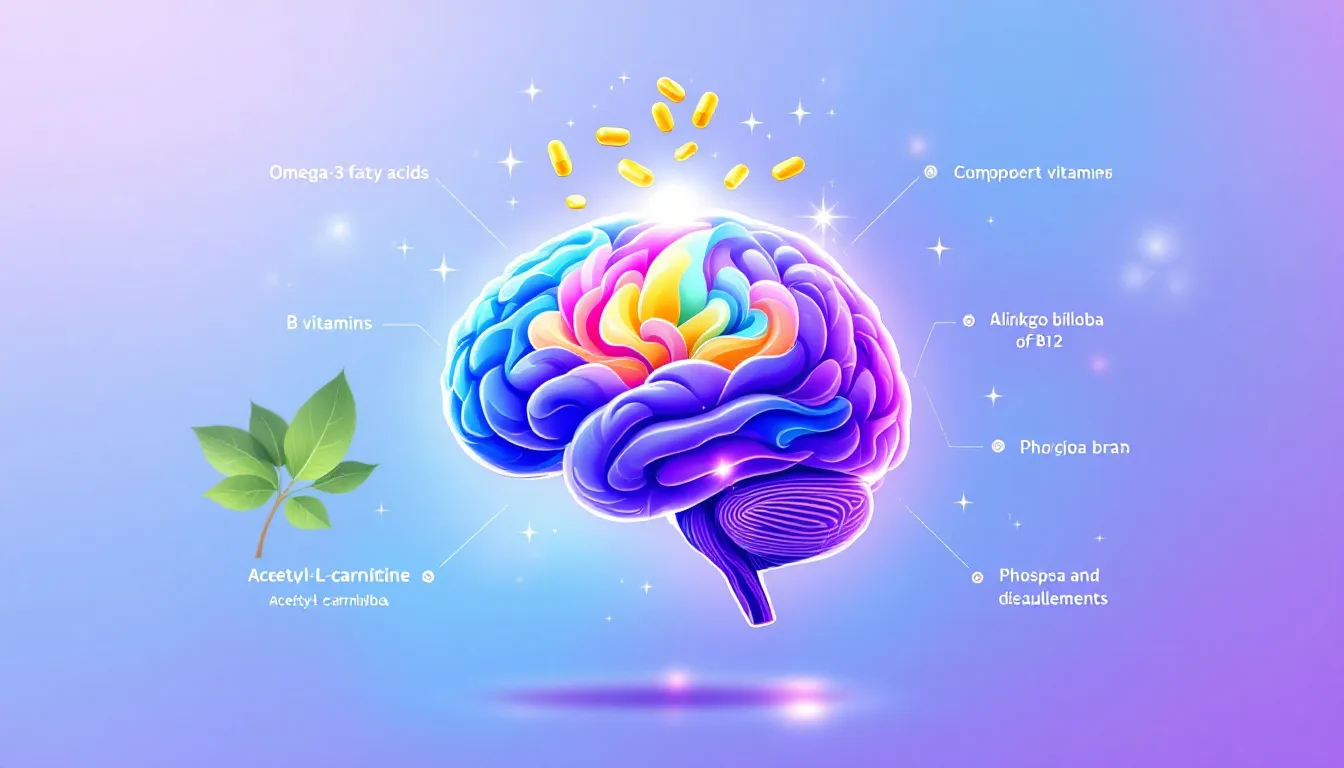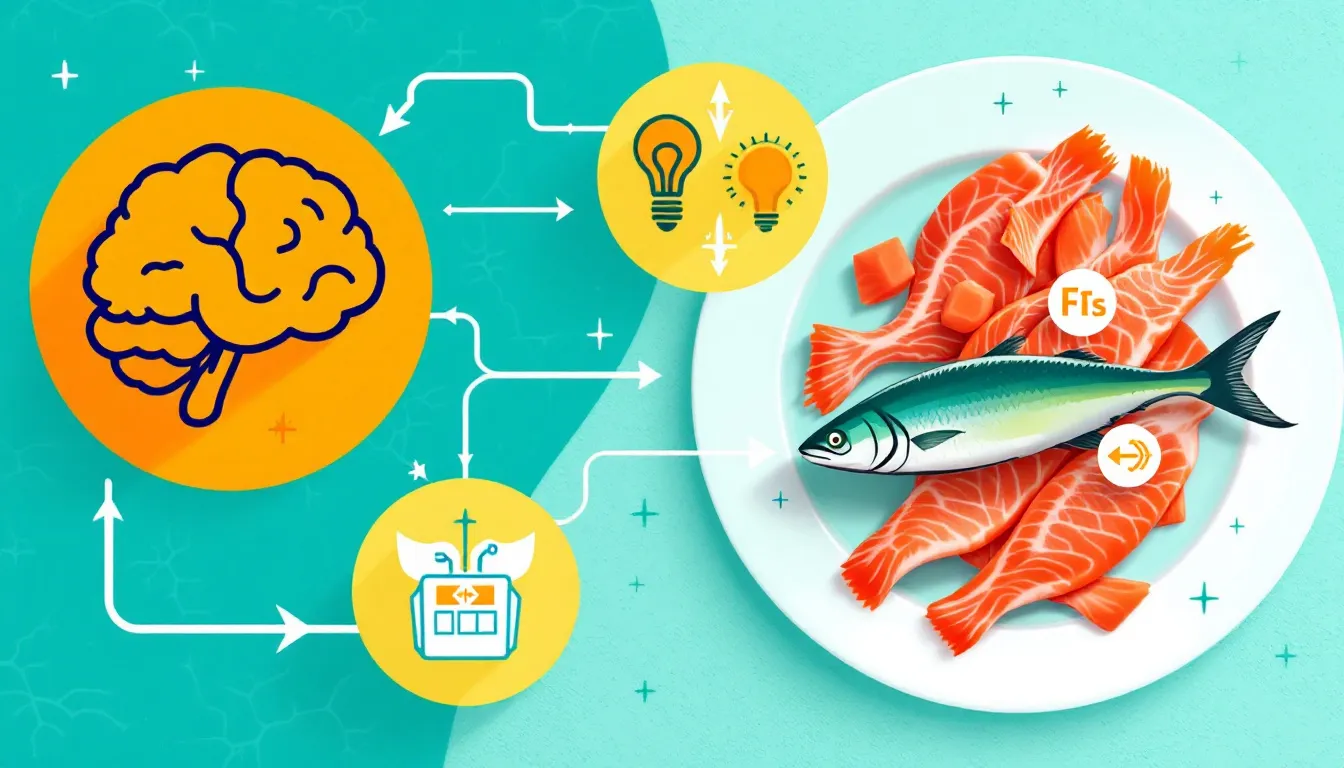Your basket is currently empty!

Are you wondering which vitamins can help improve your memory? This article outlines the essential vitamins for memory, their benefits, and how to include them in your diet.
Key Takeaways
Essential vitamins such as B12, D, and E are crucial for brain health, supporting memory and cognitive function as individuals age.
Vitamin B12 prevents cognitive decline by reducing homocysteine levels, while Vitamin D and E help protect against memory impairment and oxidative stress.
A balanced diet rich in brain-healthy foods and nutrients is preferred over supplements, though consulting healthcare professionals is essential for addressing specific deficiencies.
Essential Vitamins for Memory

Maintaining brain health is critical for preserving memory and cognitive functions, with certain essential vitamins playing a vital role in supporting these aspects. Notably, Vitamin B12, Vitamin D, and Vitamin E stand out as key nutrients that contribute to sustaining brain function by helping ward off memory loss and ensuring the normal operation of brain processes.
As we age, incorporating brain supplements containing these crucial vitamins can help preserve our cognitive abilities. It’s important to understand what each vitamin contributes. For example, while high levels of Vitamin B12 are associated with enhanced mental performance, they may not necessarily result in a marked improvement in memory.
We will now explore the specific contributions made by these vital vitamins to better comprehend their importance.
The Role of Vitamin B12 in Brain Health
Vitamin B12 is crucial for maintaining brain health, preserving normal brain function and mitigating the risk of cognitive decline. Its absence can result in serious neurological issues, such as cognitive impairment, which is particularly worrying for older adults and vegetarians who may not get enough through their diet or have trouble absorbing it.
Acting to lower high homocysteine levels that are associated with a heightened chance of dementia development, Vitamin B12 is key, even though some studies indicate supplementation might not significantly boost cognitive performance in the elderly. Nevertheless, sustaining adequate amounts of this vitamin is significant for optimal brain health. The convenience of oral supplements has been demonstrated to rectify deficiencies just like intramuscular shots do effectively.
Incorporating ample quantities of Vitamin B12 into one’s dietary regimen could be considered prudent given its association with reduced dementia risks. Continual vigilance over these levels and seeking advice from healthcare practitioners are advisable steps toward managing and averting potential shortages within groups more susceptible to such deficits.
Vitamin D: Sunshine for Your Brain

Vitamin D, often called the “sunshine vitamin,” is crucial for maintaining brain health and cognitive function. Studies have demonstrated that levels of Vitamin D above 30 ng/ml can improve executive function and overall mental performance. Despite its importance, many people, especially those in colder climates with less sun exposure, lack this vital nutrient.
A deficiency of Vitamin D has been connected to deterioration in mental capabilities and memory issues in individuals advancing in age. This includes both general memory loss associated with ageing and specific age-related declines. Up to 90% of older adults may not receive enough Vitamin D, underscoring the necessity for proper consumption either through diet or supplementation. The relevance of this vitamin extends beyond just aiding memory. It’s also implicated in neuronal signalling pathways that affect neurodegenerative diseases, indicating a wider impact on brain health.
For optimal benefits from Vitamin D—which include bolstering brain functions and staving off cognitive decline—it is advisable to get sufficient sunlight exposure, eat foods enriched with the vitamin or take supplements if necessary. Following these measures can help maintain your daily intake at levels recommended for preserving healthy brain activity into later years.
Antioxidant Power of Vitamin E

Vitamin E is vital for preserving cognitive health, particularly for the elderly, by serving as a robust antioxidant that safeguards neurons against oxidative stress and injury. This type of stress is significantly implicated in ageing and reduced cognitive abilities, thus making antioxidants such as Vitamin E essential for sustaining brain wellness.
Although an Investigation is required to ascertain Vitamin E’s efficacy in combating dementia, evidence indicates insufficient vitamin levels may be linked with cognitive impairments. Incorporating foods high in Vitamin E into your diet—like nuts, seeds, and vegetable oils—could aid in defending your brain from oxidative harm while bolstering overall cognitive performance.
Omega-3 Fatty Acids: Fish Oil and Beyond

Maintaining brain health and cognitive function is closely linked to the consumption of omega-3 fatty acids, particularly docosahexaenoic acid (DHA) and eicosapentaenoic acid (EPA). A daily intake of 250mg of DHA is recommended to support normal brain function. Including fatty fish such as salmon and mackerel in one’s diet can substantially increase omega-3 levels.
To fish, walnuts are also a rich source of Omega-3s that have been shown to improve memory when regularly consumed. Promoting the inclusion of these foods in regular meals can significantly enhance the body’s Omega-3 content, which is vital for maintaining brain health.
While fish oil supplements offer a direct way to obtain Omega-3s, alternative sources like flaxseeds and chia seeds broaden dietary options for upholding cognitive abilities. Fostering sufficient ingestion of Omega-3 through diverse food choices not only supports overall brain well-being but also aids in bolstering memory capabilities.
Folic Acid and Cognitive Function
Folic acid, a member of the B vitamin family, plays a vital role in maintaining brain health and cognitive abilities. It is instrumental in preserving mental acuity and decreasing the likelihood of cognitive deterioration. Ensuring sufficient folic acid intake is essential for neurologic function and overall mental performance.
Research indicates that folic acid, combined with Vitamin B12, helps decelerate the progression of brain shrinkage in individuals experiencing mild cognitive impairment. This underscores the benefit of combining multiple vitamins to enhance brain health effectively.
Incorporating foods rich in folic acid, such as leafy vegetables, legumes, and cereals enriched with this nutrient, into your diet can bolster cognitive functions. By doing so, you are likely to keep up suitable levels of folic acid, which aid in safeguarding brain well-being while minimising risks associated with declining cognition, an aspect particularly significant for older adults.
How to Incorporate Brain Vitamins into Your Diet

Incorporating vitamins essential for brain health into your eating habits can be effortlessly achieved. Consuming various fruits and vegetables supplies crucial nutrients for maintaining a healthy mind. Berries offer a tasty option rich in flavonoids and known to enhance memory and cognitive abilities.
Consuming tea and coffee regularly could benefit mental acuity due to caffeine content. Nuts, seeds, and fatty fish are prized as outstanding sources of Omega-3 fats, which play a pivotal role in cognitive wellness.
Embracing a diet filled with foods high in nutritional value naturally elevates the intake of vital brain vitamins. This method aids cerebral health and general physical vigour, encouraging mindful consumption and nutrition prioritisation for sustained healthfulness. Adhering to the principles of the Mind Diet reinforces cognitive functions through targeted eating practices.
Supplements vs Food: What’s More Effective?
The ongoing discussion persists about whether obtaining vitamins from dietary supplements or through whole foods and diets is better. Even though supplements can assist in fulfilling nutritional requirements, they do not enhance the overall quality of a diet. Studies suggest that the efficacy of supplements is contingent upon each person’s health condition and eating patterns.
Taking higher amounts of folic acid, exceeding 17 mg daily, may hurt memory capabilities, whereas consuming lower doses over extended periods has benefits. Exercising moderation and adhering to suitable dosages are crucial when using dietary supplements.
Whole foods provide a complex array of nutrients that bolster health and are considered superior choices. Nevertheless, whole grains and supplementary products play valuable roles in remedying specific nutrient shortfalls or addressing inadequate food consumption, offering distinct advantages. Engaging with healthcare experts can aid individuals in figuring out which method best suits their particular health needs.
Consulting Your Doctor About Memory Supplements
It is essential to consult with a healthcare professional before beginning any brain health supplements, as they could potentially interact with other prescription medications you may be taking and lead to negative side effects. Physicians are equipped to give tailored recommendations on the appropriateness and safety of various memory support supplements in light of your unique health situation.
Interactions between certain dietary supplements and prescription drugs underscore the importance of seeking expert advice and considering additional factors that might affect their use. Current research implies that some alternative treatments, like ginkgo biloba and over-the-counter brain health supplements, lack substantial evidence confirming their efficacy, highlighting why medical supervision is crucial.
Discuss this step with your healthcare provider before integrating supplements into your regimen to support memory or overall brain function. Such discussions were important. They will help safeguard against unwanted consequences and guarantee you’re making informed choices about enhancing your cognitive wellness based on accurate information tailored specifically for you.
Summary
To preserve memory and cognitive abilities, it’s essential to ensure that the diet contains the right vitamins and nutrients for brain health. Key critical components like Vitamin B12, D, E, Omega-3 fatty acids, and folic acid are instrumental in upholding brain function and staving off cognitive decline. Integrating these essential elements into one’s diet via food or supplements can be advantageous in maintaining mental acuity throughout the ageing process.
Embracing measures to bolster brain health is a wise investment for long-term wellness. Recognising the significance of these nutrients allows you to consult with healthcare professionals effectively about incorporating them into your lifestyle choices. This approach paves the way for enhanced cognitive wellbeing and an improved quality of life.
Frequently Asked Questions
What are the best vitamins for memory?
The best vitamins for memory are Vitamin B12, Vitamin D, Vitamin E, Omega-3 fatty acids, and folic acid, as they significantly support brain health and cognitive function.
Including these in your diet can enhance memory performance effectively.
How can I incorporate brain vitamins into my diet?
By integrating a variety of fruits, vegetables, nuts, seeds, and specifically fatty fish into your diet—as well as focusing on berries, leafy greens, and fortified cereals—you can effectively ensure that you are getting the necessary brain vitamins for optimal cognitive health.
Are supplements more effective than food for brain health?
Whole foods may be more beneficial than supplements for brain health because they provide diverse nutrients that work together synergistically.
Nevertheless, supplements can help if particular deficiencies are present. When considering supplementation for brain health, it’s wise to seek personalised advice from a healthcare professional.
Should I consult a doctor before taking memory supplements?
Consulting a healthcare professional before taking memory supplements is essential, as they can offer tailored advice based on your specific health needs and medication interactions.
This step helps ensure your safety and the effectiveness of the supplements.
Can Vitamin D improve cognitive function?
Certainly, having adequate levels of Vitamin D can improve cognitive function and executive abilities. In contrast, a lack of this vitamin can result in the deterioration of mental capabilities and problems with memory retention.
Thus, ensuring that one’s diet or supplement regimen provides enough Vitamin D is essential for maintaining these important mental functions.

